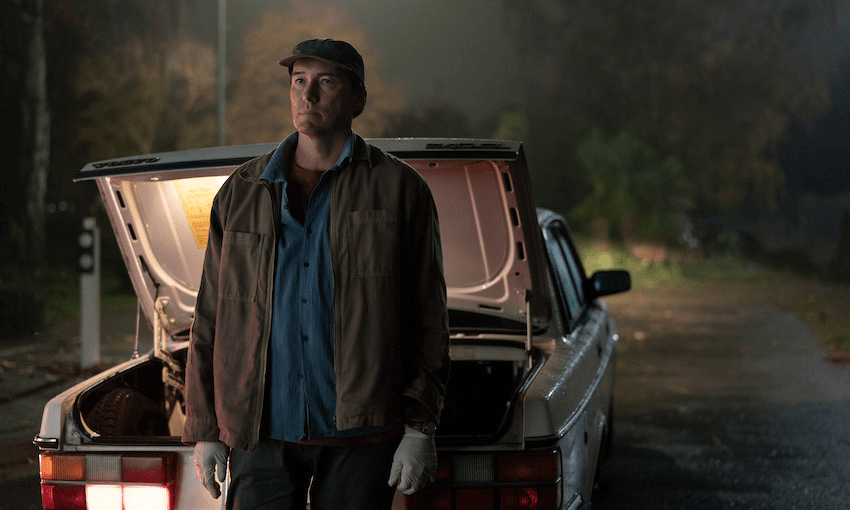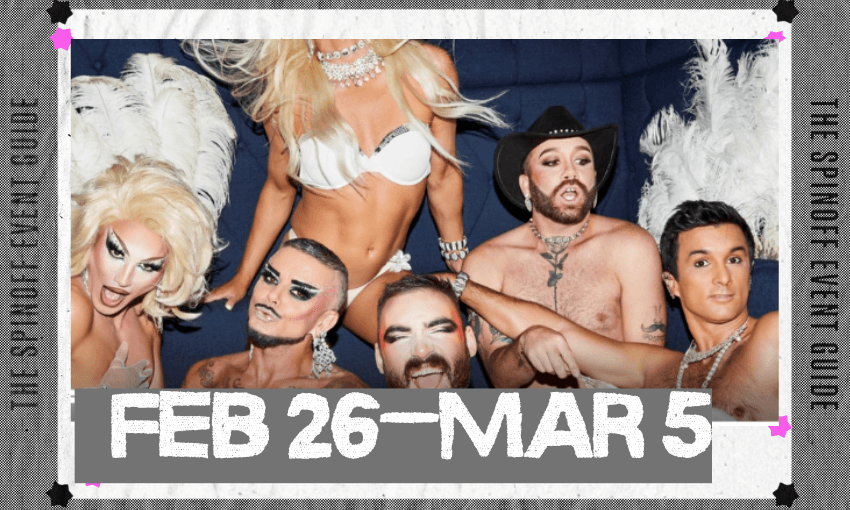Our second post-Covid big budget drama following After the Party is stylish, unsettling and extremely impressive, writes Duncan Greive.
We open on expansive shots of a version of Christchurch, gleaming bright and a little too pretty. The setting of Dark City: The Cleaner has an unmistakable comic book quality, with artfully unreal newspapers and brands, pristine 70s busses and hi-fi equipment, while cellphones and modern cars make it clear this isn’t a period piece. There’s affable narration from Joe Middleton (Cohen Holloway), the titular cleaner, talking us through his affection for the city.
Then, in one of many queasy twists, Middleton is revealed to be not just our guide for the series, but also the unctuous serial killer stalking the city’s young women. Holloway dominates the series, on-screen or talking us through almost every scene – the series inevitably lives or dies on his performance.
Mercifully he’s superb in (almost) every way. His skin is damp and mottled, his hair lank – physically he perfectly embodies the socially awkward, hyper-repressed Middleton, who works as a janitor at a police station and is thus privy to every beat of the futile investigation into the murders he’s been committing for two years. Holloway’s performance is brilliantly contained, he’s deferential to the point of servility, struggles to meet the cops’ eyes and is disgusted by the affection of his colleague Sally Galletly (a quietly compelling Dea Doglione).
Still, due to his narration, we’re always in Middleton’s world – an uncomfortable situation. He’s an affable murderer of beautiful and wholly innocent women, and for long stretches of the first episode you naturally wonder whether Dark City is going to be content to just show us Middleton’s perspective. For parts of the first episode, we’re lulled into thinking it will be content to live as a stylish twist on some familiar tropes. Middleton’s mum is awful and he ticks many other serial killer 101 traits, while the cops are vaguely hapless.
It would be the kind of edgy narrative device common in 90s movies and 00s HBO-ish dramas, while also being deeply out of step with contemporary mores. Yet just when the plot starts to get over-familiar, a journalist named Melissa Flowers (a scene-stealing, almost show-stealing Chelsie Florence) appears for a deliciously unhinged scene that completely upends Dark City’s carefully cultivated order, while entirely living up to its name.
It’s just in time for the end of the first episode, and completely explodes your expectations, moving it into the same kind of macabre universe as the likes of Killing Eve. Middleton has to switch from control to vulnerability, and the plot is further destabilised by the apparent arrival of a copycat killer onto the scene. The show is based on a series of novels by Christchurch crime writer Paul Cleave, and it’s to his credit that it manages to walk such a narrow line between the familiar and the riotously unhinged.
Reviewers have only been supplied the first two episodes, but on that basis this feels like another big win for Te Puna Kairangi. It’s a special fund established during Covid to bolster the local screen industry, and it validates a thesis which has been floating around untested for years: that if you give our drama creators more money, you’ll get a far superior product.
It’s birthed a clutch of well-received shows, including The Gone and Far North. Dark City is the first to arrive since the debut of After the Party, arguably the best TV drama we’ve ever made. It’s an imposing act to follow, and it’s to the show’s credit that it doesn’t suffer too much by comparison. It really is a step above the vast bulk of what we’ve made – Rick Jacobsen’s assured direction and the enjoyably extra performances of the leads ensure that at its best it’s riveting, coal-dark and gasp-inducing.
Dark City does have some flaws. The first is an occasional tendency for the writing to drift into hollow cliché – an interrogation scene in episode two featuring two longtime Shortland Street actors unavoidably recalled the soap, courtesy of hoarsely yelled lines lacking the finesse of many other moments. A much more significant issue is Holloway’s narration, which has a deadpan blankness that sucks the energy out the first episode at times.
He offers such frequent monologues that it verges on Peep Show’s level of interiority of character, but lacks for either the comic delivery nor craft of that (admittedly all-time great) show. That said, the device becomes less relied upon and thus less intrusive over time, so viewers should persist with it even if it jars.
Why? Because what’s good about Dark City is original and electrifying. It’s one of what Sky are terming “Sky Originals” – along with the rebrand of Prime to Sky Open, it’s the company’s most ambitious attempt yet to draw much closer to the local conversation in Aotearoa. Dark City is a huge swing for all involved, and despite some uneven moments, when the show really connects it’s wildly impressive – further evidence that when given the space and funding, our television can elevate to any bar we care to set for it.
Dark City: The Cleaner begins March 4 on Neon, Sky Go, and SoHo.



